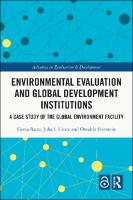Environmental Evaluation and Global Development Institutions
Proposal review
A Case Study of the Global Environment Facility
| dc.contributor.author | Batra, Geeta | |
| dc.contributor.author | Uitto, Juha I. | |
| dc.contributor.author | Feinstein, Osvaldo N. | |
| dc.date.accessioned | 2021-10-11T14:25:21Z | |
| dc.date.available | 2021-10-11T14:25:21Z | |
| dc.date.issued | 2022 | |
| dc.identifier | ONIX_20211011_9781000481945_38 | |
| dc.identifier | ONIX_20211011_9781000481945_38 | |
| dc.identifier | OCN: 1260169440 | |
| dc.identifier.uri | https://library.oapen.org/handle/20.500.12657/50908 | |
| dc.description.abstract | Evaluation is increasingly important for finding sustainable solutions for the people and the planet, based on a systematic analysis of what works, for whom, and under what circumstances, and to contribute to the achievement of the Sustainable Development Goals, as they pertain to the environment. This book explores why the Global Environment Facility (GEF) invests in evaluation for accountability and learning to inform its decision-making on programming priorities, and how this leads to wiser funding decisions and better program performance on the ground. The book is based on real-life experiences of how to make evaluation count for international environmental action. Drawing upon comprehensive evaluations of the GEF, it provides unique insights from authors responsible for designing, implementing, and disseminating the findings of the evaluations. No other multilateral development or environment agency places evaluation fully at the center of their decision-making. The book outlines the trends in the global environment and the changing landscape of international environmental finance. It defines the role of the GEF and explains its institutional framework and the unique partnership that involves donor and recipient countries, multilateral development banks, UN agencies, nongovernmental organizations (NGOs), and national agencies in the developing countries. Further, it provides useful pointers to other organizations wishing to enhance evidence-based decision-making for improving their relevance, performance, and impact. The book will be most suitable for graduate-level, specialized study in a variety of disciplines such as environmental and development economics, political science, international relations, geography, sociology, and social anthropology. | |
| dc.language | English | |
| dc.relation.ispartofseries | Advances in Evaluation & Development | |
| dc.subject.classification | thema EDItEUR::K Economics, Finance, Business and Management::KC Economics::KCV Economics of specific sectors::KCVG Environmental economics | en_US |
| dc.subject.classification | thema EDItEUR::K Economics, Finance, Business and Management::KC Economics::KCM Development economics and emerging economies | en_US |
| dc.subject.classification | thema EDItEUR::R Earth Sciences, Geography, Environment, Planning::RN The environment::RND Environmental policy and protocols | en_US |
| dc.subject.other | Environmental economics | |
| dc.subject.other | Development economics and emerging economies | |
| dc.subject.other | Environmental policy and protocols | |
| dc.title | Environmental Evaluation and Global Development Institutions | |
| dc.title.alternative | A Case Study of the Global Environment Facility | |
| dc.type | book | |
| oapen.identifier.doi | 10.4324/9781003207979 | |
| oapen.relation.isPublishedBy | 7b3c7b10-5b1e-40b3-860e-c6dd5197f0bb | |
| oapen.relation.isFundedBy | Global Environment Facility | |
| oapen.relation.isbn | 9781000481945 | |
| oapen.relation.isbn | 9781003207979 | |
| oapen.relation.isbn | 9781032076140 | |
| oapen.relation.isbn | 9781032076195 | |
| oapen.imprint | Routledge | |
| oapen.pages | 184 | |
| peerreview.anonymity | Single-anonymised | |
| peerreview.id | bc80075c-96cc-4740-a9f3-a234bc2598f1 | |
| peerreview.open.review | No | |
| peerreview.publish.responsibility | Publisher | |
| peerreview.review.stage | Pre-publication | |
| peerreview.review.type | Proposal | |
| peerreview.reviewer.type | Internal editor | |
| peerreview.reviewer.type | External peer reviewer | |
| peerreview.title | Proposal review | |
| oapen.review.comments | Taylor & Francis open access titles are reviewed as a minimum at proposal stage by at least two external peer reviewers and an internal editor (additional reviews may be sought and additional content reviewed as required). |

